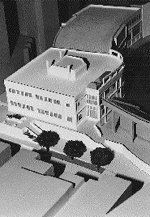Internationally excellent

This is what we call a 'wow!' said a grinning Vice-Principal Derek Drummond, BArch'62. What brought a broad smile to the lips of the V-P of Development and Alumni Relations and other McGill administrators was a Top Ten list not the Late Night with David Letterman variety, but a list of International Centres of Excellence published recently in the London Sunday Times. The Times article reported on a talk given by Dr. Robert Stevens, Master of Pembroke College, Oxford, in which he expressed concern that Oxford was losing ground to universities in the U.S. in terms of international prestige. On the list of the world's best which accompanied the article, McGill appeared in tenth spot, behind Cambridge, Oxford, Sorbonne and Heidelberg. The top five institutions listed were American heavyweights Harvard, Yale, Princeton, Chicago and Stanford.
|
Cheque this out
 McGill alumni have established a tradition of being remarkably generous to their alma mater, and in recent years students have started showing the same spirit of support. Each graduating class now pledges a parting gift under the banner of Class Action, but other projects are decided through referenda in which students vote to allow special fee levies during their undergraduate years. McGill alumni have established a tradition of being remarkably generous to their alma mater, and in recent years students have started showing the same spirit of support. Each graduating class now pledges a parting gift under the banner of Class Action, but other projects are decided through referenda in which students vote to allow special fee levies during their undergraduate years.
In an initiative unrivalled in Canada, students have helped to raise $1.2 million for the University's libraries after voting in 1996 to designate $20 a year per student for library improvement. McGill agreed to match whatever students raised from undesignated funds collected during the recent capital campaign. Liz Gomery, BA'98, Students' Society Vice-President (University Affairs), handed over a cheque at a special ceremony in April. "All Canadian universities have been adversely affected by the systematic cuts to education in the past decade," said Gomery. "Students don't want
to see those cuts damage such an important aspect of our University. Libraries are at the heart of knowledge and research at McGill."
Plans so far call for $750,000 to be spent on acquisitions. A further $100,000 will go to creation of an "intelligent" classroom in the McLennan Library, equipped with 25 networked computers, where special classes can be conducted
or where users can explore databases and receive instruction in using the McGill libraries' electronic resources.
Some other major projects helped by student contributions (which total more than $3 million in the last three years) are the almost-completed athletics complex and the new Student Services Building, scheduled to open in 1999. On a less grand scale,
student associations in each faculty regularly collect money to upgrade lab equipment or buy books and journals. But whether the gifts are large or small, what is impressive is the unselfishness of the students. Most projects are fully realized only after the benefactors have graduated -- another alumni tradition.
|
Cowabunga!
 There can be few more dazzling leaps than the one taken by the Macdonald Campus dairy herd in the past year. None of that jumping over the moon stuff, but, according to a recent article in the McGill Reporter, the 75 high-performance cows have shot from 2,080th spot to 9th among Quebec's 9,000 dairy herds. Animal Science professor Elliot Block, who took over as farm director last summer, says Macdonald's milkers -- who produce roughly 30 litres per day each vs. 21 for the average cow -- are doing what comes naturally. No nasty steroids or growth hormones are involved, he says, just There can be few more dazzling leaps than the one taken by the Macdonald Campus dairy herd in the past year. None of that jumping over the moon stuff, but, according to a recent article in the McGill Reporter, the 75 high-performance cows have shot from 2,080th spot to 9th among Quebec's 9,000 dairy herds. Animal Science professor Elliot Block, who took over as farm director last summer, says Macdonald's milkers -- who produce roughly 30 litres per day each vs. 21 for the average cow -- are doing what comes naturally. No nasty steroids or growth hormones are involved, he says, just
an extra milking per day and an improved diet. "We did a complete feed analysis and balanced the ingredients in their diet," Block says. The quality of hay and silage was improved and more grains were added to supplement the existing corn and soy meals. What may have made the Holsteins so happy is that the diet supplements include the leftover grains from the distilling of rye whiskey -- purchased from Seagram's, no less -- bourbon and beer.
Whatever the reason, this remarkable moo-ve in the rankings should be celebrated. Bartender, a couple of Brown Cows!
|
Groundbreaking research at new Centre
A crack team of researchers under the leadership of Dr. David Kaplan is being assembled at the Montreal Neurological Institute and Hospital to study the causes, diagnosis and treatment of brain tumours at the newly established Brain Tumour Research Centre. Kaplan, one of North America's most respected neuroscientists, trained in the Harvard lab of Nobel laureate Dr. Harold Varmus and comes to McGill from the National Cancer Institute in the U.S. He turned down offers from other universities to come to Montreal to establish the Centre because, he says, "the MNI is one of the strongest neuroscience centres in the world."
A groundbreaking ceremony for the new $26-million facility -- which will eventually house 100 scientists, six biotechnology research laboratories and a conference centre equipped with the latest in communications technology -- took place in April. While the science will be world class, the human side has not been forgotten.
A house has been purchased at Pine and University Streets to accommodate patients' families. Says Kaplan, "Hotels can be expensive -- when someone in your family is ill, you've already got a lot to deal with. The families will be right across the street from the hospital and they'll be close to our doctors and social workers."
Although currently the subject of relatively little research, brain tumours claim more lives among children than any other disease. As the population ages, the incidence of brain tumours in the elderly is increasing. This year in North America, 80,000 new cases of primary and secondary tumours will be diagnosed.
 |  |
| Above: Quebec Deputy Premier Bernard Landry (left), MNI Director Dr. Richard Murphy, Principal Bernard Shapiro, Chancellor Gretta Chambers and Dr. Abe Fuks, Dean of Medicine. Right: model of the Brain Tumour Research Centre |
|
The red has spread
Vice-Principal (Administration and Finance) Phyllis Heaphy, BA'70, DipPubAc'82, advised the University Senate that she would ask the Board of Governors at the end of May to approve a deficit budget for 1998-99. The anticipated shortfall is $5 million. Although at press time the Governors had not met, Principal Shapiro told senators that he thought the Board would agree but, he added, "not a dollar larger and not another one next year." With continuing cuts from Quebec, a 3.4% decrease in enrolment (reducing the provincial grant by a further $2 million) and unanticipated expenses related to the January ice storm, a balanced budget for next year would be impossible to achieve "without dangerously impairing the quality of our academic programs" according to Heaphy's report to Senate. Running a deficit for one year will allow a little breathing space to find more ways to implement cuts and to generate revenue. In fact, McGill has managed its finances remarkably well in recent years, absorbing annual cuts from the province while still reducing its accumulated deficit by about $15 million. At one time, the formula for calculating operating grants for Quebec universities penalized McGill and a $75-million deficit built up during the 1980s. The formula was made more equitable in 1991. Now, with cuts to the university system of 25% over the last five years, other schools are running up the red ink. "Laval is planning for a huge deficit," Heaphy told Senate, adding that Université de Montréal has an accumulated debt roughly the same size as McGill's. Meanwhile, Concordia Rector Frederick Lowy, BA'55, MD'59, is forecasting a shortfall of about $8 million in his university's 1998-99 budget.
|
Under construction
 If you're coming to campus this summer, be prepared for a little dust, dirt and noise. Okay, a lot of dust, dirt and noise. Under a special campus renewal program, $22.5 million in improvements will be carried out to University buildings, tunnels and mechanical systems. If you're coming to campus this summer, be prepared for a little dust, dirt and noise. Okay, a lot of dust, dirt and noise. Under a special campus renewal program, $22.5 million in improvements will be carried out to University buildings, tunnels and mechanical systems.
The money comes from funds set aside by McGill for capital alterations, augmented by a grant from the Quebec government under its Plan d'accélération des investissements publics. Among the more visible projects scheduled are the replacement of the concrete terraces outside the Arts Building, Burnside Hall and the Redpath Museum, as well as the re-roofing of several dozen buildings and repairs to masonry and windows. Most of the sprucing up will be finished in September, so the Macdonald and downtown campuses should be looking their best for this year's Homecoming. If you want to know exactly what's under construction and when, check the Physical Resources web page at www.is.mcgill.ca/phyres/PAIP97.htm.
|
Athletes in the hall
 Four new inductees have been named to McGill's Sports Hall of Fame. James Worrall, BSc'35, a track and waterpolo star who was the flag-bearer for Canada at the 1936 Olympics in Berlin, heads the stellar list, along with the late George Vernot, BSc'26, a two-time Olympic medalist in swimming. Also inducted posthumously were Dr. George Laing, MD'15, a football and tennis star, and Dr. Don Young, MD'35, a basketball and football legend. Four new inductees have been named to McGill's Sports Hall of Fame. James Worrall, BSc'35, a track and waterpolo star who was the flag-bearer for Canada at the 1936 Olympics in Berlin, heads the stellar list, along with the late George Vernot, BSc'26, a two-time Olympic medalist in swimming. Also inducted posthumously were Dr. George Laing, MD'15, a football and tennis star, and Dr. Don Young, MD'35, a basketball and football legend.
Worrall, an 84-year-old retired lawyer living in Toronto, starred on four championship track teams at McGill from 1931-35 and finished fourth in the quarter-mile hurdles at the Berlin Olympics. He served as president of the Canadian Olympic Association from 1964-68, was a member of the Inter-national Olympic Committee from 1967-89 and was inducted to the Canadian Sports Hall of Fame in 1987.
Vernot was the last Canadian swimmer to win an Olympic medal in the 1500m freestyle, capturing silver at the 1920 Antwerp Games, along with a bronze medal in the men's 400m freestyle. The captain of McGill's swim team from 1922-25, Vernot also competed at the 1924 Games in Paris.
Laing was a Quebec singles tennis champion and also played on McGill's 1913 and 1915 Yates Cup championship football teams. In 1914 he set a McGill record which still stands -- a 115-yard kickoff return for a touchdown against Queen's -- and was described by the Montreal Herald as "the most brilliant player in Canadian football today." Dr. Laing died in 1963.
Young, the third member of McGill's Sports Hall of Fame to be born in Almonte, Ont., played on four championship basketball teams and on the 1928 Yates Cup football squad. A seven-time all-star in football, he played both flying wing and quarterback from 1928-34. Young, who died in 1988, won two Grey Cups with the Ottawa Rough Riders and was named to the Ottawa Sports Hall of Fame in 1970.
Four inductees from the post-war era will be announced prior to McGill's Hall of Fame Luncheon on September 17. Some tickets are available at $40 and can be reserved by calling (514) 398-7002.
|
|











